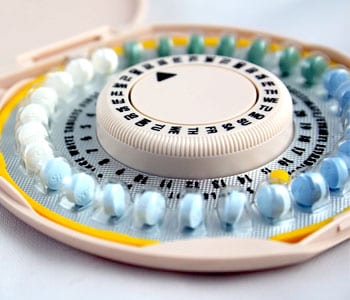What is the Birth Control Pill?
Birth control pills are taken orally daily, and are 99% effective if taken religiously. The problem is no one is perfect and so they miss a day here or there, resulting in a real effectiveness of 91%. There are “combination” pills with a mix of estrogen and progestin and there are progestin-only pills. In addition to preventing pregnancy, the pill has other benefits such as reducing menstrual cramps, regulating your period, reducing bone thinning, reducing acne, among others.

Who is a good candidate for Birth Control Pills?
Birth control pills are made of synthetic progesterone and estrogen, hormones that prepare the body for pregnancy. The Pill works by regulating hormone production throughout a woman’s cycle. Without spikes in these reproductive hormones, the ovaries do not release eggs, so pregnancy is highly unlikely (only 1 in 1,000 women who take birth control pills as directed get pregnant during the first year of use).
Oral contraception is appropriate for nearly all healthy women who do not smoke. Good candidates may have one or more of the following traits:
- Can remember to take a pill every day.
- Place high priority on prevention success (the Pill is 99% effective when taken properly).
- Continues to use condoms if at risk for sexually transmitted infection.
What are the benefits of combination Birth Control Pills?
Combination birth control pills offer several advantages, including:
- High rate of effectiveness.
- Effects are quickly reversible.
- Help regulate menstrual cycles.
- Reduce the intensity of premenstrual symptoms.
- Decrease menstrual pain and bleeding.
- Can improve acne.
- Can prevent ectopic pregnancy (which occurs outside the uterus).
- Reduce the risk of endometrial cancer and ovarian cancer.
- Decrease benign breast cysts.
- Decrease the emotional symptoms of premenstrual syndrome.
- Reduce the rate of bone loss in women over age 30.
How To Take The Pill
With combination pills, as long as you take one pill every day, you’ll be protected from getting pregnant. You don’t have to take it at the same time every day, but this is a good idea so that you get in the habit of remembering to take your pill.

Combination birth control pills come in 21-day, 28-day, and 91-day packs. The last days of each of these packs contain “reminder” pills that are hormone-free. Most have iron and other supplements. You get your period during the hormone-free pills. If you have difficult periods, the pill will lessen their strength and duration. But you may want to consider the 91-day packs, as these keep you period-free for a full three months, followed by a one-week period.
Progestin-only pills must be taken within the same 1-hour window every day for you to be protected. This makes their use a little more restrictive.Progestin-only pills only come in 28-day packs.That’s all the guidelines for use. You simply need to be consistent on taking your pills every day and starting the next pack when your previous pack runs out.
Are there any side effects?
As birth control pills have been redesigned to include lower doses of hormones, instances of side effects have decreased. The risk of side effects is higher for women who smoke, have certain medical conditions such as a history of endometrial cancer, and who are over 35.
Some of the disadvantages associated with oral contraception include:
- Could cause headaches, nausea, vomiting, or spotting. This typically happens only for the first few cycles after starting birth control pills.
- May cause breast tenderness or irregular bleeding.
- May increase breast size.
- May cause weight gain or weight loss.
- May increase the risk of blood clots in a small percentage of women.
- May increase the risk of high blood pressure in some patients.
- Could increase the risk of stroke (very slightly).
Will I have trouble getting pregnant after using the birth control pill?
Three things need to happen for a woman to regain fertility after coming off any kind of birth control. These include:
- Ovulation must resume
- The cervical mucus must return to normal to be “sperm friendly.”
- The uterine lining must return to normal to be “embro friendly.”

It is possible for ovulation to resume but for the endometrial lining to remain unprepared for an embryo to implant successfully. Ovulation may resume but the cervical mucus may still be too thick for sperm to reach the egg for fertilization. That said, statistics show that 1 in 5 women conceive during their very first cycle after discontinuing oral contraception. Furthermore, 8 in 10 women are pregnant by the end of their first year off birth control pills.
Is the cost of the Birth Control Pills covered by insurance?
Under the Affordable Care Act, most insurance companies are required to offer basic birth control, including birth control pills, at no cost to the patient. There are a few exemptions, such as short term health insurance and houses of worship. With these exemptions, approximately 67% of women with health insurance can expect to receive full coverage, which means they should pay nothing for contraception.
More than 27% of American couples using birth control choose the pill. This contraceptive method has a long history of pregnancy prevention when used correctly. To learn more about our birth control services, call our office at 281.444.3440 and schedule your visit with one of our friendly, board-certified OB GYN physicians.
Find out if the birth control pill is the right choice for you! Call our office or fill out the contact form below to speak with someone about your birth control today!